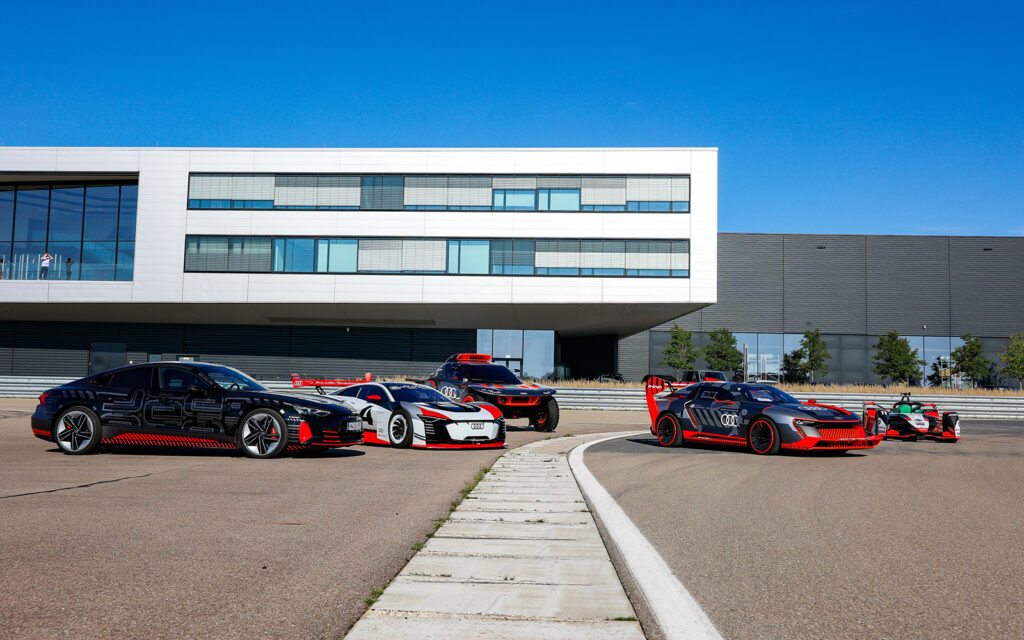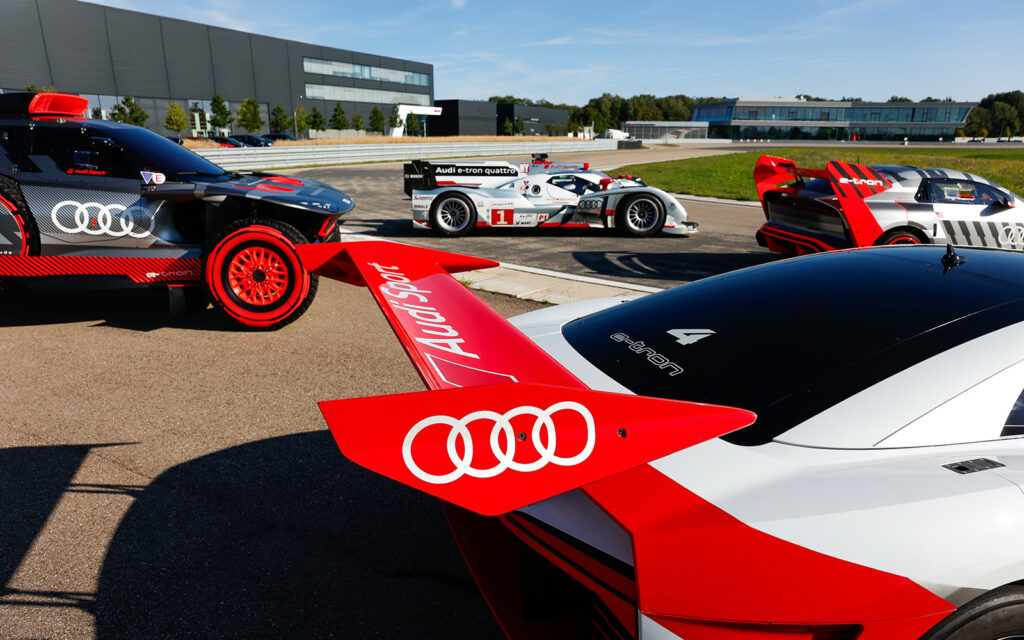
Verizon Building Customized 5G Environment at Audi Test Track
- The private network uses multiple cores, radio frequencies and network technologies to replicate connectivity environments found across the world, giving Audi a competitive advantage in the global market by ensuring connected technology is sound and functional on public roads in a wide variety of geographies.
- The Audi test track near Ingolstadt, Germany will be equipped with a dual 5G and LTE Modular Private Wireless platform (Nokia), private multi-access edge-compute MEC capability (Amazon Web Services), real-time video and data transmission technology (Smart Mobile Labs), C-V2X communication, and mobile/automotive applications spanning voice, data, autonomous mobility, safety and more.
- The dynamic multi-core network marries the onsite private test network with replicas of the Verizon public network in the USA, local European networks, and Audi’s MVNO partner networks in Asia-Pacific.
[source: Verizon Sourcing LLC]
BASKING RIDGE, N.J. and INGOLSTADT, Germany — Verizon Business and Audi AG today announced a partnership to build a state-of-the-art private wireless network and tech-testing environment at Audi’s automotive test track in Neustadt, Germany. The dynamic, multi-core wireless network is designed to duplicate network conditions in key markets around the world, with custom-built replicas of Verizon’s U.S. public network, local European networks, and the roaming network of Audi’s MVNO partner in Asia-Pacific. Audi and other brands from the Volkswagen Group have access to the track and network.
As the automotive industry continues its evolution toward software-defined vehicles, the geographic flexibility of the Neustadt test-track network gives Audi a competitive advantage in the global market by streamlining its multi-territory R&D test cycle, better replicating driver/passenger experiences around the world, and providing access to the latest network and application technology. Testable applications include voice, video, safety, autonomous mobility, vehicle-to-cloud communication, OEM-customer interactions, cellular vehicle-to-everything (C-V2X) features and functionalities, and more.

To achieve this blend of geographic flexibility and technological capability, Verizon Business tapped into a robust ecosystem of partners. The network uses a dual 5G and LTE Modular Private Wireless platform from Nokia, C-V2X and private MEC infrastructure utilizing AWS Outposts from Amazon Web Services, and real-time video and data-transmission technology from Smart Mobile Labs (stream management and distribution, full HD streaming, push to talk, push to video, stream recording, et. al.).
“Our needs for this test track were complex and multi-dimensional, encompassing many technologies, geographic network conditions, and industry trends. Verizon Business was able to provide a complete solution that will take time and cost out of the testing cycle and give us a competitive advantage in the global marketplace,” said Petr Kozak, Head of Development Infotainment, Connectivity, Data Management and Artificial Intelligence, Audi AG.
“This is about much more than equipping a work site with a private network. This is about bringing network conditions from around the world to one test facility, allowing Audi to exceed the already lofty demands of the mobility market looking years into the future,” said TJ Fox, SVP of IIoT and Automotive, Verizon Business. “Increasingly, vehicles are not just about transportation, but a means of communication, entertainment, education, and work — effectively, rolling cell phones and high-powered computers. That means the vehicle of the future will be packed with technology that needs to work under many different sets of network conditions, and Audi and Verizon Business are solving for those needs with this state-of-the-art facility.”
Verizon Business has end-to-end responsibility for the delivery and support of the high-performance, stable and secure private LTE/5G network, which can be adapted to the developments of the 3GPP standard over time.
About Verizon
Verizon Communications Inc. (NYSE, Nasdaq: VZ) was formed on June 30, 2000 and is one of the world’s leading providers of technology and communications services. Headquartered in New York City and with a presence around the world, Verizon generated revenues of $134.0 billion in 2023. The company offers data, video and voice services and solutions on its award-winning networks and platforms, delivering on customers’ demand for mobility, reliable network connectivity, security and control
About Audi AG
The Audi Group is one of the most successful manufacturers of automobiles and motorcycles in the premium and luxury segment. The brands Audi, Bentley, Lamborghini, and Ducati produce at 21 locations in 12 countries. Audi and its partners are present in more than 100 markets worldwide. In 2022, the Audi Group delivered 1.61 million Audi vehicles, 15,174 Bentley vehicles, 9,233 Lamborghini vehicles, and 61,562 Ducati motorcycles to customers. In the 2022 fiscal year, AUDI Group achieved a total revenue of €61.8 billion and an operating profit of €7.6 billion. Worldwide, more than 87,000 people worked for the Audi Group in 2022, over 54,000 of them at AUDI AG in Germany. With its attractive brands, new models, innovative mobility offerings and groundbreaking services, the group is systematically pursuing its path toward becoming a provider of sustainable, individual, premium mobility.
About Smart Mobile Labs AG
Smart Mobile Labs AG (SML) is one of the leading German providers of 5G campus networks. In the field of 5G networks, To tailor a network to the specific requirements of customers, SML not only offers mobile solutions but also provides the option of implementing customer-oriented software and integrating devices such as mobile devices, cameras, drones, etc. With its product EVO (Edge Video Orchestrator), SML is a global leader in many-to-many real-time transmission. Desktop and smartphone apps offer the possibility to live stream from multiple (mobile) cameras and manage or select the video streams in real-time. The applications range from terrain surveillance, streaming at events, streaming telemetry from test vehicles, drone, and robotics control to live television production in locations where wiring is not possible.







Responses